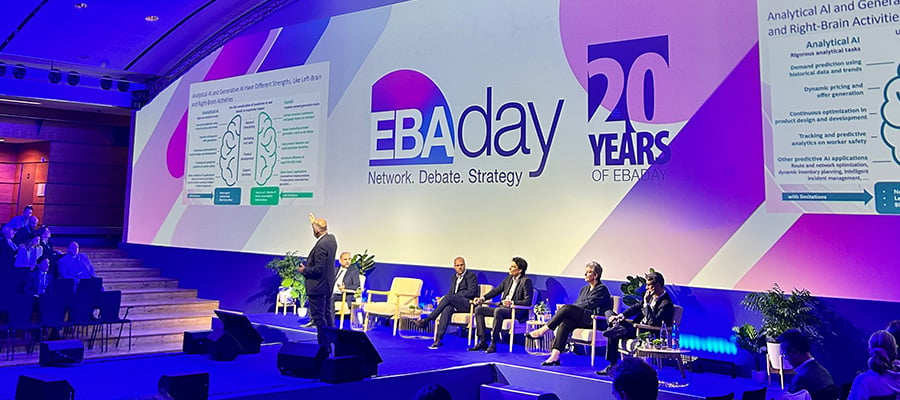The EBADay 2024 event, held at the Lisbon Congress Centre on June 18 and 19, brought together leading payments and transaction banking executives from around the globe. The summit provided a platform for discussing the latest trends and challenges in the payments industry, with a particular focus on interbank transactions and innovations in payment systems.
One of the prevailing themes was the trendiness of payments, especially within the bank-to-bank environment. Numerous vendors are competing in this space, highlighting the industry's emphasis on payments as a distinct domain, separate from cash management and liquidity.
 A hot topic of discussion was the cross-border frictions impeding proper end-to-end communication. The complexity of achieving seamless cross-border payments was a focal point, emphasizing the need for innovative solutions to overcome these barriers. This issue is particularly pertinent as financial institutions seek to streamline their international operations.
A hot topic of discussion was the cross-border frictions impeding proper end-to-end communication. The complexity of achieving seamless cross-border payments was a focal point, emphasizing the need for innovative solutions to overcome these barriers. This issue is particularly pertinent as financial institutions seek to streamline their international operations.
At EBADay, TradeHeader showcased babel20022, our prototype solution for ISO 20022 harmonization across payment jurisdictions. We presented babel20022 at the FinTech contest, where it garnered significant interest and positive feedback from both the audience and the jury. Our solution addresses the pressing need for a unified approach to ISO 20022 messaging, ensuring seamless integration and communication across various payment infrastructures.
Engaging corporate clients and fostering innovation was another major discussion point. Banks are finding it challenging to achieve high adoption rates for their solutions among corporate clients. The discussions highlighted the difficulties in innovating products that truly meet customer needs and drive engagement, raising questions about whether corporates are willing to invest in these new solutions.
Regulatory compliance remains a constant in the financial sector. The consensus at the event was that regulations are here to stay, compelling financial institutions to find ways to monetize their compliance efforts and prepare for future regulatory requirements. This pragmatic approach aims to turn regulatory compliance from a burden into a potential revenue stream.
Instant payments and verification of payee solutions were among the most frequently discussed topics. These solutions are seen as pivotal for enhancing payment security and efficiency. However, the practical challenges of implementing various instant payment schemes, such as SEPA, were also highlighted, revealing the complexities involved in achieving seamless instant payments and highlighting the need for continued effort and innovation in this area.
The adoption of cloud solutions is another significant trend. Banks are increasingly turning to outsourced cloud APIs instead of traditional on-premises developments. This shift towards cloud solutions points to a strategic move towards more flexible and scalable technology infrastructures. Moreover, the evolving relationship between banks and FinTech companies from competition to partnership was a key theme. Banks now see FinTechs as partners that can help them gain market share and accelerate time to market.
 Despite the event's strong commercial focus, discussions on data and technical challenges were less prominent but they remain crucial. Managing and integrating data effectively continues to be a significant challenge for the industry, underscoring the need for robust technical solutions.
Despite the event's strong commercial focus, discussions on data and technical challenges were less prominent but they remain crucial. Managing and integrating data effectively continues to be a significant challenge for the industry, underscoring the need for robust technical solutions.
Interestingly, the transformation from MT to ISO 20022 formats is no longer a dominant trend, although many institutions still use these transformations in the background. The focus has shifted to other areas, reflecting the evolving priorities in the payments industry. Concurrently, the push for data richness and the full utilization of ISO 20022 is anticipated to be driven more by regulatory mandates than by financial institutions themselves. As regulations continue to tighten, institutions will be compelled to enrich their data and enhance their processes to comply with these evolving standards.
Lastly, while discussions about blockchain, Central Bank Digital Currencies (CBDCs), and tokenization were still present, they were noticeably less frequent compared to previous years. This indicates that, although important, these topics did not dominate the conversations at the event as much as in the past.
Overall, EBADay 2024 provided a comprehensive overview of the current state and future directions of the payments industry. The event highlighted ongoing challenges and opportunities in cross-border payments, corporate engagement, regulatory compliance, and technological innovation. As the industry moves forward, collaboration between banks, FinTechs, and regulatory bodies will be essential in shaping the future of payments, driving innovation, interoperability, and efficiency across the global financial landscape. TradeHeader's participation, especially with the babel20022 prototype, highlighted our commitment to addressing the industry's most pressing issues and contributing to the ongoing evolution of payment systems.





